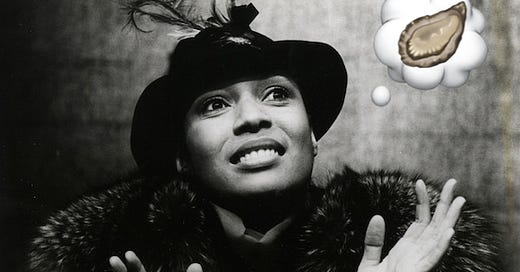No, I do not weep at the world—I am too busy sharpening my oyster knife.
Salty tears or briny oysters: That’s the binary choice set out by Zora Neale Hurston in her best-known quip. Aw, shucks.
It sums up the pioneering Black anthropologist, author, and folklorist quite well, landing smack in the middle of her 1928 essay “How It Feels to be Colored Me” — newly reprinted in the collection You Don’t Know Us Negroes — just after she explains that she’s not “tragically colored” and that “the world is to the strong regardless of a little pigmentation more or less.”
“Slavery is sixty years in the past,” the granddaughter of slaves proclaimed. “The operation was successful and the patient is doing well, thank you.” For Hurston, dwelling on yesteryear just cut into one’s oyster-slurping hours. Even when history was unignorable, she brushed it off:
Sometimes, I feel discriminated against, but it does not make me angry. It merely astonishes me. How can any deny themselves the pleasure of my company!
This attitude was enough to make her enemies within the Harlem Renaissance, and she doubled down with a bold stylistic choice: In her writing, she rendered Black language just as she heard it. This led her critics, Richard Wright foremost among them, to accuse her of minstrelsy and “facile sensuality.” (She shot back that “he does not write by ear unless he is tone deaf!”)
The arc of her redemption was longer than her life: Controversial in Black culture and a curio in white culture, Zora Neale Hurston fell out of favour and spent her last years cleaning hotel rooms in Miami. In 1975, 15 years after her death, Ms. magazine published Alice Walker’s Looking for Zora, a first-person account of Walker’s search for Hurston’s unmarked grave in Eatonville, Florida. Since then Zora has been all but canonized, with her novel Their Eyes Were Watching God appearing on high school syllabi across the United States.
The unapologetic way she lived and wrote is well captured in “Characteristics of Negro Expression,” a loose riff of an essay that’s both a clever work of anthropology and a crib sheet to her style. She describes the Black American “urge to adorn” the language with picturesque metaphors like
One at a time, like lawyers going to heaven.
Sobbing hearted.
I’ll beat you till [you] smell like onions.
Regular as pig-tracks.
Syndicating [as a synonym for gossiping]
Alongside “double-descriptives” that emphasize adjectives and put nouns into action:
Low-down
Top-superior
Lady-people
Hot-boiling
Chop-axe
Kill-dead
Speedy-hurry
And an liberal intermingling of verbs and nouns
Puts the shamery on him.
’Taint everybody you kin confidence.
I wouldn’t friend with her.
She won’t take a listen.
He won’t stand straightening
Much of this vibrant language became the lingua franca, especially in the U.S. South, as the Black American “made over a great part of the tongue to his liking and has had his revision accepted by the ruling class.” It also went directly into Hurston’s work, which is stuffed till bursting with metaphor. Take this explanation of how singing talent was all that mattered in Black music clubs:
The girl who could hoist a Jook song from her belly and lam it against the front door of the theatre was the lead, even if she were as black as the hinges of hell.
If she had softened this language, explained her terms, cut the verbiage, she might have found a broader audience. But in Zora Neale Hurston’s view, bloodless writing was for cowards. As she wrote to a friend in 1943:
I have never liked stale phrases and bodyless courage. I have the nerve to walk my own way, however hard, in my search for reality, rather than clink upon the rattling wagon of wishful illusions.
Quick quips; lightning
“A language is a dialect with an army and a navy.”
— Max Weinreich
“You can’t hold a man down without staying down with him”
— Booker T. Washington
“I know only two words of American slang, ‘swell’ and ‘lousy.’ I think ‘swell’ is lousy and ‘lousy’ is swell.”
— J.B. Priestley
Speaking of...
Blazing trails
Surprising audiences
That was GWQ NO. 135, your top-superior companion on the rattling wagon of useful illusions. Note that friend was a verb long before Facebook. Claudia Roth Pierpont’s 1997 New Yorker assessment of Hurston’s life is worth your time. Making lawyers present themselves single file to St. Peter seems totally fair. Elements of Wit: Mastering The Art of Being Interesting smells like onions, in a good way. The ❤️ below would friend with you.





